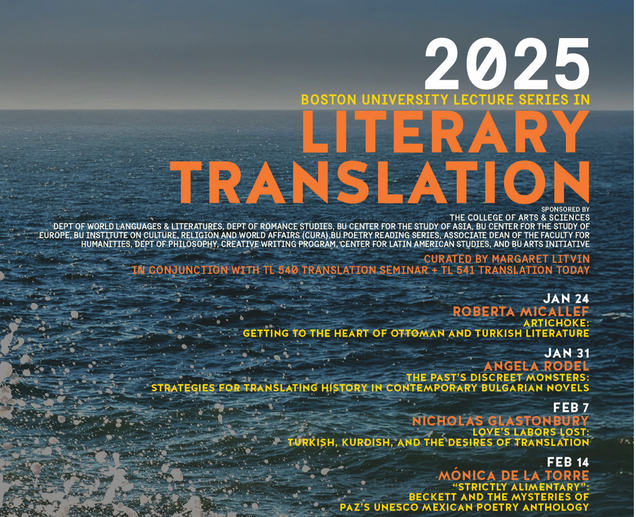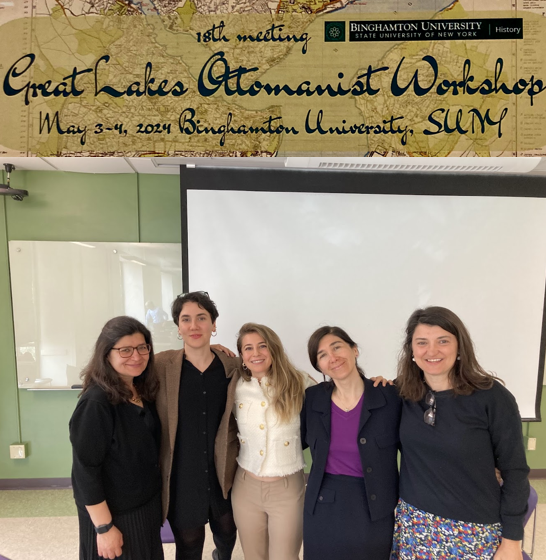BLOG
By Roberta Micallef January 22, 2025
The BU Translation Seminar is once again hosting an extraordinary lecture series. Please visit their website for further details:
The first speaker – this Friday is yours truly: 
By Roberta Micallef· November 24, 2024
I’m happy to share two websites I just discovered that might interest all literary translators working with Ottoman, Turkish, or any other languages:
1. The Translation Database. This is how the website is described.
“The only resource of its kind, the Translation Database was founded in 2008 by Three Percent and Open Letter Books at the University of Rochester to track all original publications of fiction and poetry published in the U.S. in English translation. With more than ten years of data, it is a robust tool for identifying what books are available, from which countries and languages, published by which publishers, and more. With the goal of determining what new voices were being made available to English readers, the database excludes all retranslations of previously published books, giving readers and researchers a clearer sense of what contemporary voices are making their way into English.”
2. A very useful website, “Three Percent A Resource for International Literature” named as such because “Unfortunately, only about 3% of all books published in the United States are works in translation.” This website was founded in 2007 to be a resource for readers, editors, and translators interested in finding out about modern and contemporary international literature.
Happy explorations,
RM
By Roberta Micallef · August 13, 2024
If you have been thinking about fictional translators and would like to put your thoughts into writing please see the Call For Papers below.
Fictional Translators in Literature and Cinema
From Wes Anderson’s Isle of Dogs to Denis Villeneuve’s Arrival, and from Carol Shields’s Unless to Sabahattin Ali’s Madonna in a Fur Coat (Kürk Mantolu Madonna), translator and interpreter characters populate fictional works both on screen and on the page. The Journal of Literary Studies: Nesir‘s seventh issue is dedicated to exploring the role of translators and interpreters in contemporary society as represented in literature and films.
The issue draws inspiration from the “fictional turn” in Translation Studies, a vibrant and enduring area of critical inquiry, as evidenced by recent publications such as Denise Kripper’s Narratives of Mistranslation: Fictional Translators in Latin American Literature (2023). The issue seeks to feature articles that shed light on the complex dynamics and conditions under which translators perform their task, as well as the representation of their labor and professional identity across various artistic mediums, especially in literature and cinema. Accordingly, the journal invites submissions that contextualize the practitioners of translation within the relevant theories developed in both Translator Studies and Literary and Film Studies.
In light of recent advancements in artificial intelligence, the journal also welcomes critical essays and speculative fiction that explore the future of the profession in terms of job security, work conditions, copyright infringements, ethical considerations, data privacy, technological unemployment, skill shifts, and the potential for AI to augment human capabilities. Book reviews and translations from any language into Turkish or English will also be considered for publication. All submissions must be made electronically via the submission page on Nesir‘s website at https://nesirdergisi.com/ by August 31, 2024.
Potential topics include but are not limited to:
- Translators as mediators and conflict resolution experts
- Translators on war zones
- Translators as secret agents, sleuths, detectives
- Multilingual child characters as interpreters
- Translators as immigrants, exiles, asylum seekers
- Translator memoirs
- The interaction between translators and technology
- The definition of the profession – what has changed/might change with the launch of ChatGPT and subsequent generative AI tools
- Translators in sci-fi
- Translators and malpractice/infidelity
- Self-translators
- The willful erasure of the translators
- The interaction between translators and non-human
- The dynamic between translators and publishing agents
Why Translate Late-Ottoman Literature?

What a treat to present our work to the experts in our field! We hope to continue working together to present late Ottoman literature to an Anglophone audience.
· Panel Chair: Nefise Kahraman
· Burcu Karahan, “Unveiling the Erotic: Translating Late Ottoman Erotic Fiction in the Wake of the Second Constitution”
· İci Vanwesenbeeck, “Search for a New Method in Translating Samipaşazade Sezai’s Sergüzeşt”
· İpek Sahinler, “Translating Transgender Existence in Late-Ottoman Literature: The Case of Omer Seyfettin”
· Roberta Micallef, “Unveiling and Framing Late Ottoman Literary Texts: Omer Seyfeddin & Emine Semiye Hanim”
By Roberta Micallef · May 1, 2024
Some exciting news for those who want to share the joy of reading Turkish literature with their friends who don’t know Turkish. More wonderful literary works are available! Aji’s translation has been nominated for a prestigious award. We wish him the best of luck!
A classic of Turkish literature, Gulyabani, by Hüseyin Rahmi Gürpınar is now available in English! Translated by Hande Eagle and published by Translation Attached publishing house, it is bound to delight English-speaking audiences everywhere. If you can read Turkish you may be interested in reading this interview about translating Gulyabani by Hande Eagle.
The Wounded Age and Eastern Tales by Ferit Edgü, translated from Turkish by Aron Aji is one of three finalists for the 2024 EBRD (European Bank for Reconstruction and Development) Literature Prize.
What's New or Newsworthy in the World of Ottoman and Turkish Literary Translations?
April 10, 2023
Welcome to our first blog post! This week we have some resources for anyone interested in modern or contemporary Turkish literature and award for translations from Ottoman to English and into Turkish from any language.
• If you are interested in Modern or Contemporary Turkish literature do give the Literaturca podcast a try and participate in the Turkish Literature in Translation Reading Group
• The Walter Andrews Ottoman to English Translation Award. Visit the American Association of Teachers of Turkic languages website for further details about this award.
• The Talat Sait Halman translation award is open to submission for the translation into Turkish of any literary work published in the preceding year by publishers and translators.
